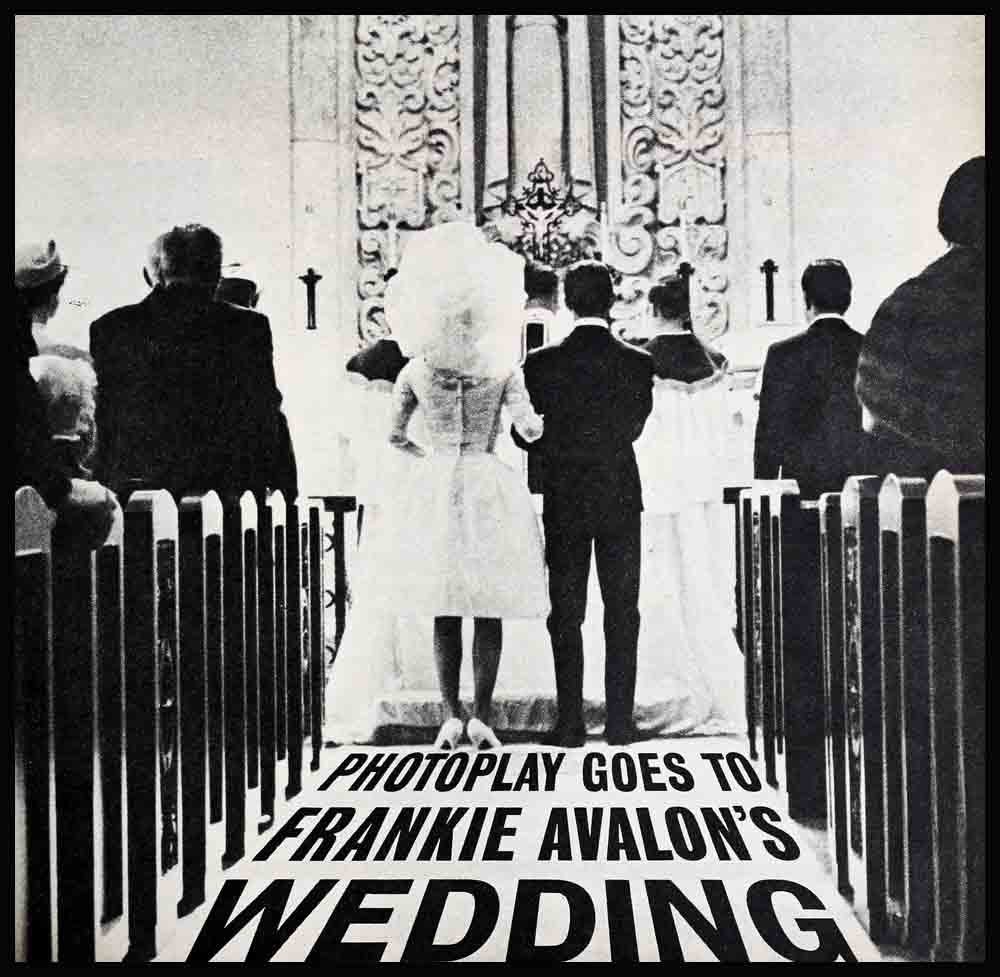
We’re Going to Frankie Avalon’s Wedding
It is 10:25 and twenty of us are gathered in the sunny rectory yard at Saint Charles Church, North Hollywood, waiting with Frankie Avalon for his bride. He’s only a little nervous, his round brown eyes are dazzling. More nervous is his manager, Bob Marcucci, so Frankie laughingly dubs him the “worst man.” Most debonair is Frankie’s dad who is an old pro, he shook in his shoes four years ago when Frankie’s sister was married. Most bubbling is Mrs. Anita Nocon, the Avallone’s neighbor who flew from Philadelphia to witness this great moment in the life of her “second son,” Frankie. Her own son, Jimmy, is a high school senior and couldn’t get time off to attend the wedding.
Frankie’s mother stands close to his dad. She’s pretty and bubbling and can’t quite believe it. “Sometimes I find myself crying out of sheer happiness,” she tells me. “We just love Kay, we’ve gotten to know her. We were so lucky to be here for the romance!” She’s wearing her azurine mink, a beautiful cape Frankie gave her last Christmas, and the gold and diamond watch he gave her this Christmas. “It’s the beginning of a beautiful life for him,” Mrs. Avallone says, “to have someone of his very own. . . .”
Bob’s mother, Mrs. Marcucci, joins us; Bob resembles her just as Frankie resembles his mother.
“Your son will be next,” I tell her, and she sighs, smiles, wishing it were true.
Kay’s mother, a slender vivacious woman in a blue knit dress, brings a corsage box to Mrs. Avallone. Both mothers have corsages of small white orchids, and I pin on Frankie’s mother’s.
A car drives up, here comes the bride; and Bob Marcucci quickly leads us through the great church and into the little chapel of Our Lady . . . a superb little chapel—all white, the walls deeply carved, the pews of gleaming walnut, the stained glass windows are amber and beige with touches of mauve and dots of blue. Twin tapers are burning on the altar, two bunches of white mums and glads stand at either side of the railing. There has never been a Hollywood wedding quite like this. There are no stars here, and no fans. I count twenty-three guests, each person related by blood or by love to Frankie and Kay. They exude a sort of radiance, the place is luminous with it. Above the doorway is graven Mateo Dei Vallis Regina Ora Pro Nobis.
Here comes the bride . . . the wedding march fills the little chapel. Gretchen Wayne, Kay’s sister, comes slowly down the aisle, her suit bright yellow raw silk, a sheaf of white roses on her arm. Her daughter, three-year-old Elisha, tries to attract her attention, Gretchen smiles serenely and walks on. Bob Marcucci joins her at the second row, steps with her to the altar. Michael Wayne puts his arm around his daughter and keeps her close.

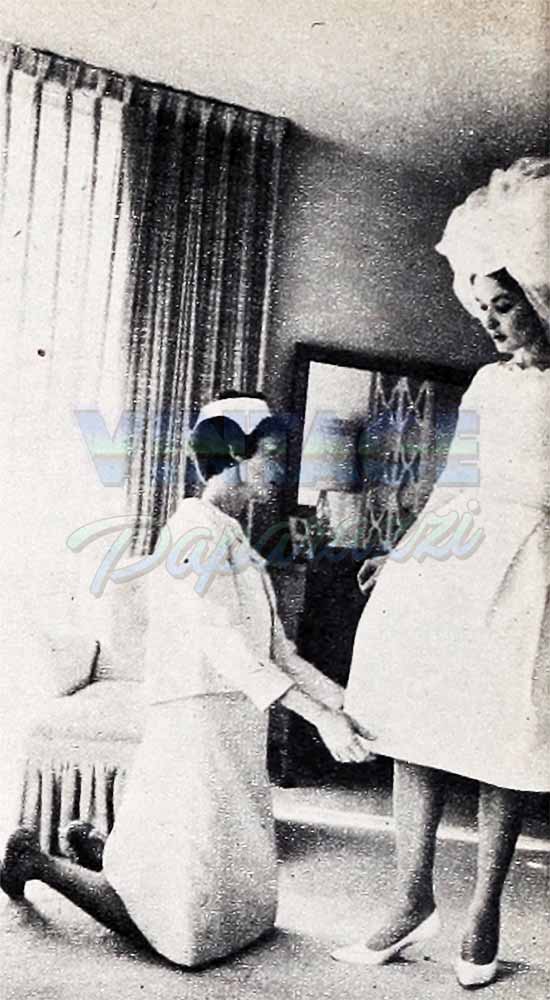
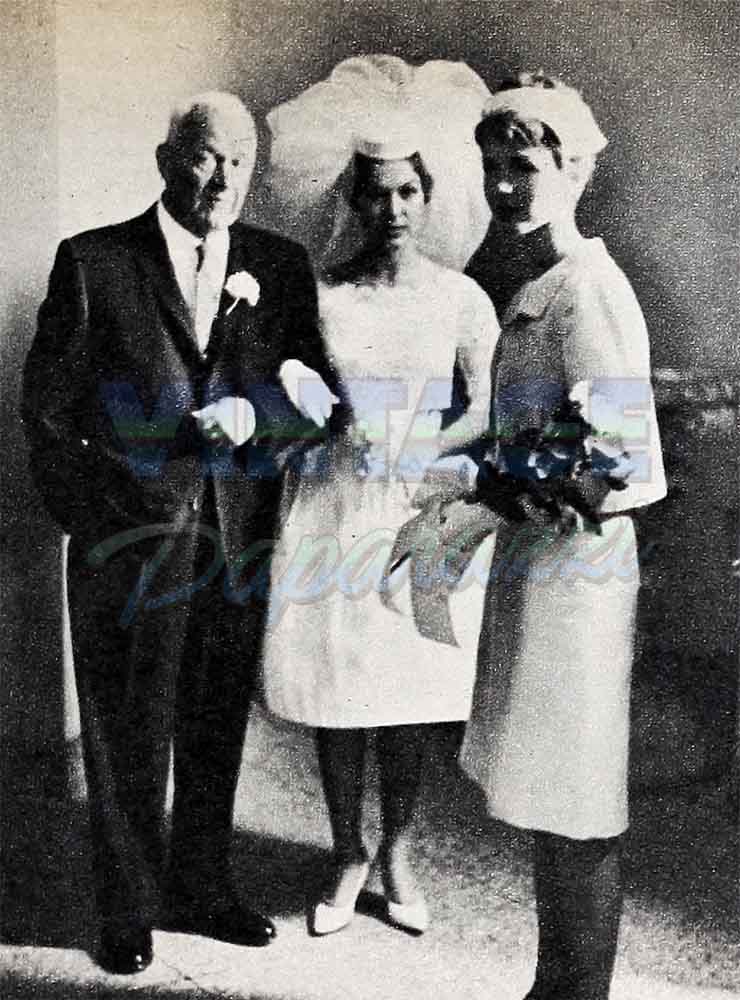
Now it is Kay and her dad. You see the look on Frankie’s face as he awaits her, all glowing and tender. Here she is—the girl he proposed to when she had curlers in her hair—and here she is now, a Dresden figurine in white peau de soie and lace, her veil a bouffant halo. He nods to her, takes her from her dad, draws her hand through his arm and keeps his hand over hers. They genuflect, rise and stand before the priest, who is assisted by two handsome little acolytes in red collared surplices.
“You are about to enter the union most sacred and serious, established by God . . .” the priest says.
Frankie keeps his hand on hers. “. . . aligning you together for life. What is to come, success and failure, pleasure and pain, is hidden from your eyes, you know not what lies before you. But truly you are sincere, willing and ready. . . .”
This is Monsignor Harry C. Meade who has known the Deibels for many years, who has known Frankie since he has been attending church with Kay, who certainly helped them in their wish to keep their wedding personal.
“. … You voluntarily surrender your individuality to love,” he is saying. “You become one in heart, mind and affection. . . .”
Frankie’s mother and father sit close together. Kay’s mother and father sit close together. everyone is totally involved.
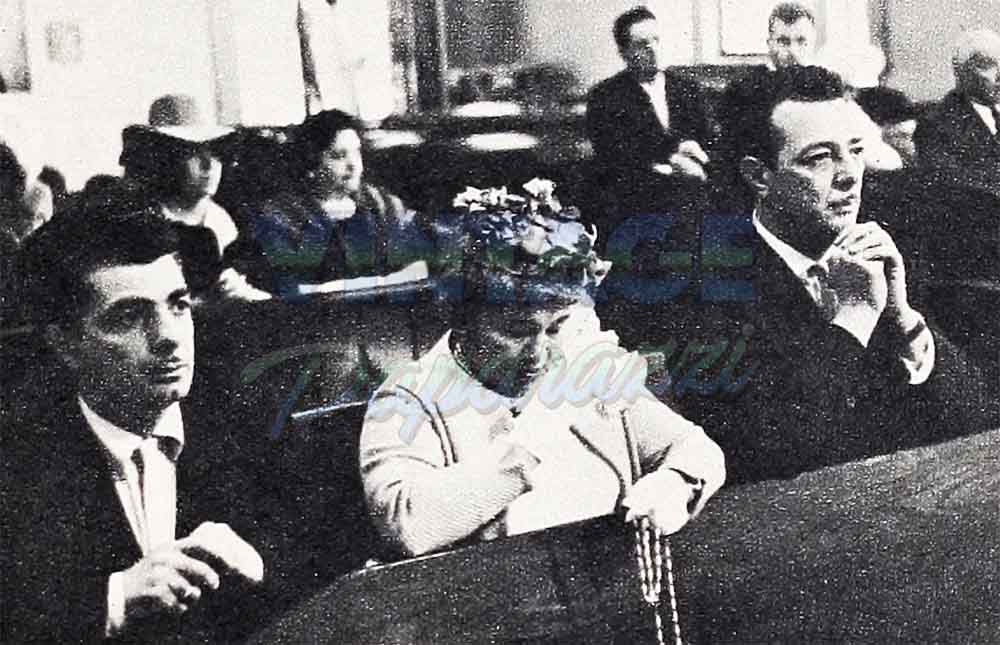
“. . . Love is perfect, God so loved the world that He gave His only Son. The Son so loved us He gave Himself for our salvation. May your love grow deeper and stronger as life goes on. . . .”
And now the crux of it, “. . . Do you Frank Thomas Avallone take this woman, Kathryn Deibel, for your lawful wife, to have and t o hold, from this day forth, for better or worse, for richer or poorer, in sickness and in health, until death do you part?”
Frankie looks right at her. He answers firmly. Then Kay. The rings are blessed, they are exchanged, now the nuptial mass. . . .
While mass is celebrated, Frankie and his bride kneel before the altar, so quiet, they might almost be as graven as the image of the mother of God above the altar. You see Frankie’s neat dark head, the well formed shoulders, he’s a strong man, stronger than I’d ever realized, kneeling there. And Kay is a dainty girl but not frail, she has inner strength. Together they have the will to cope with marriage, make it work, make something joyous out of living.
This is the girl who could have been a movie star, she was a Miss Rheingold runner-up, she did some TV commercials, she was signed to a contract at Warners. But she didn’t like the acting bit, she didn’t want that kind of life. Kneeling every morning at this same church, taking communion, she prayed for a woman’s life—happiness, a marriage in which she could find her career.
This is the boy who soared to stardom as a teenager and enjoyed everything life had to offer. I remember his telling me four years ago, “Everything I’ve done, I’ve done out of sheer enjoyment . . . out of deep love for my parents . . . out of friendship for my relatives, managers, friends and fans. If there’s any feeling that has been constant in my life it’s, the feeling of love. I’m sentimental. I love people and can’t ever forget what my parents sacrificed for me, how wonderful my managers have been to me, how friends and fans have plugged for me through thick and thin.”
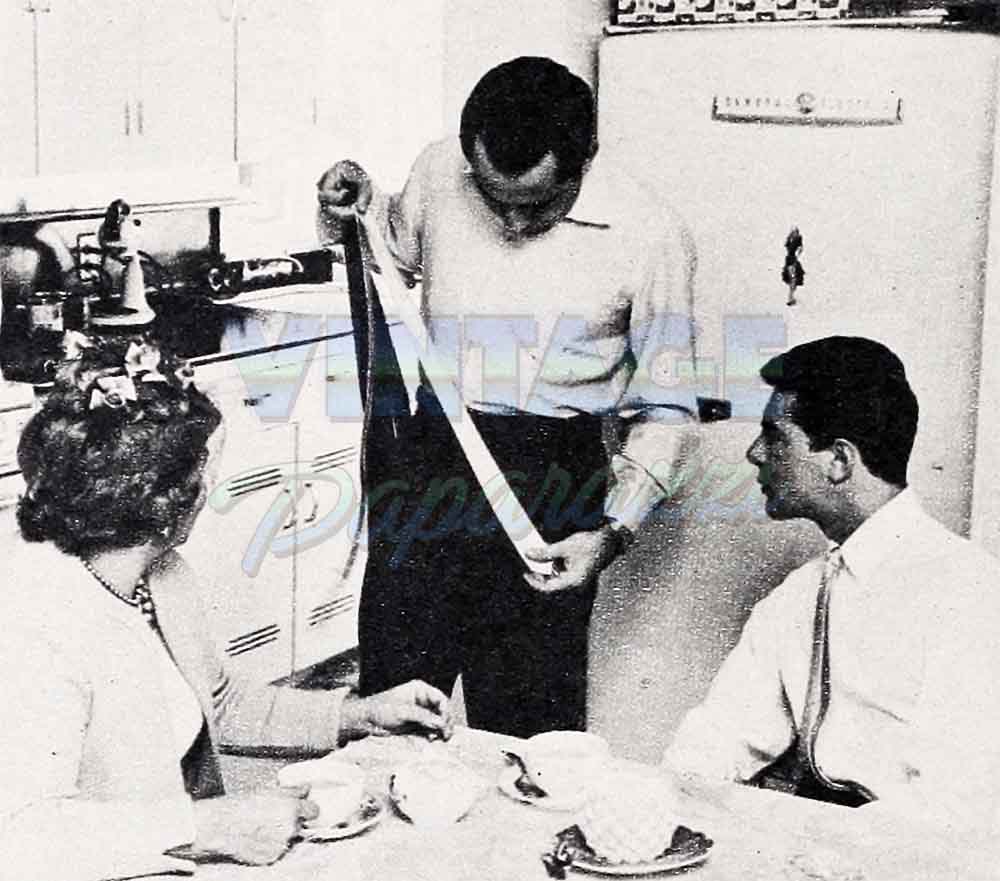

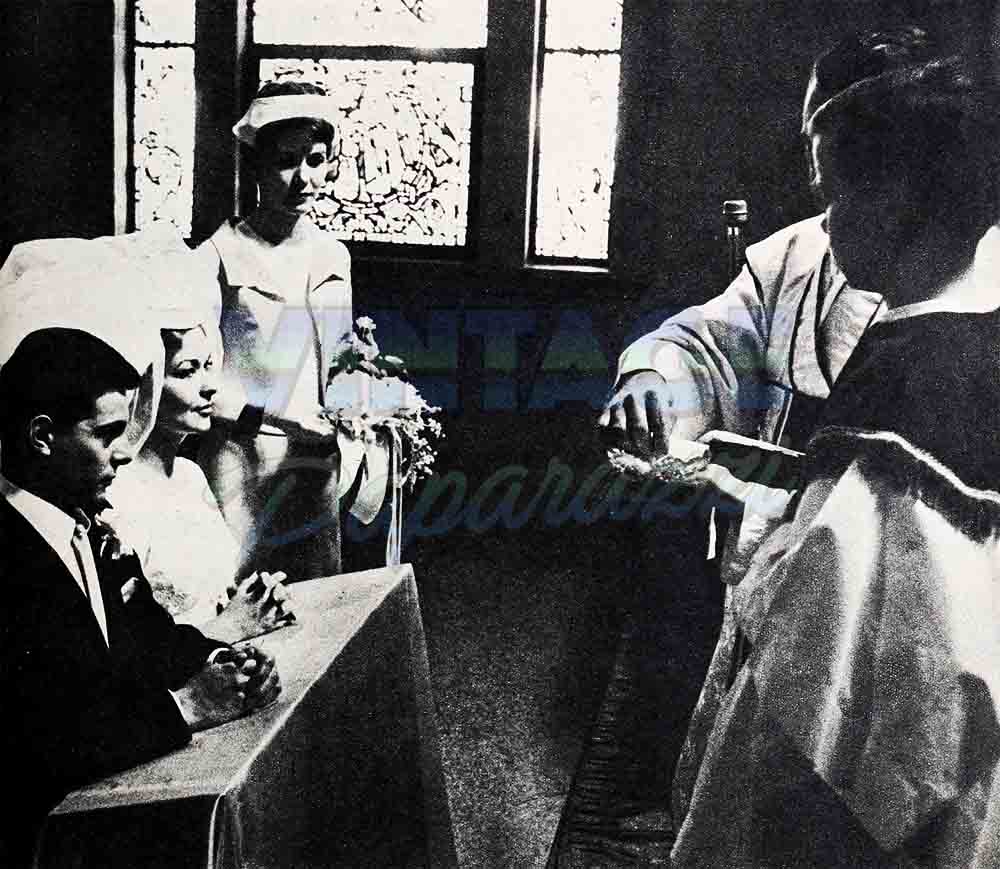
And he dreamed of someday having someone to share it all with—the traveling, the excitement, the opening nights at the Copa and the one night stands in towns like Chanute, Kansas. The foreign locations for pictures in Spain and Italy. Only it seemed like something far away, something that would happen when he was twenty-eight or thirty.
The wedding mass goes on, and as I listen I can’t help but think of how this romance began. . . .
Five months and three days ago, he met Kay, the girl now kneeling beside him. A Hollywood writer brought her over to his place one night. There was always an open house at Frankie’s, always a card game going on. This night Frankie was playing gin with Bob Marcucci’s Uncle Roc, Frankie’s Uncle Tom was kibitzing and Uncle Joe was cooking up a storm (he’s Bob’s uncle). Friends would wander in and out all evening, talking and listening to music and eating Uncle Joe’s marvelous canelloni and fettucine. It was like a continuous party—it never broke up until two or three or four in the morning—no one ever wanted to go home.
That was how they met . . . and that was only the first of many such meetings.
And, after those evenings, she would have to be up early, to get to her job—Kay was working downtown as a dental technician and comparing notes with her girl friends. They’d agree, “Tonight we’re not going over there, we’re going to be in bed by seven” and then they’d end up again at Frankie’s.
This was August and Frankie was off for a two week tour: Hawaii, West Virginia, Texas. Oh, he thought of Kay all right. “Five-three, very good figure and a plain kind of beauty,” he told me. “Not all made up. She just wears a little eye make-up, a little lipstick, her hair’s kind of long and she’s very good, she does her own hair, sometimes up, sometimes down, she wants to cut it but I won’t let her, not yet. After a while she can cut it but it’s so pretty, sort of light but not blond, golden brown and her eyes are green. The main thing, she’s very feminine.”
And when he came back he called her. He took her to dinner at La Scala. . . . “That was the first time we’d ever been alone,” he said, “and I think I knew from that first night that this was what I wanted, I was going to marry this girl. It’s funny, isn’t it? You can’t explain love. You can’t possibly imagine it until you feel it. What was there about her? She’s a very nice girl, intelligent, understanding, she has a great sense of humor, a mind of her own but she’s flexible. And good looking, very very good looking, everything—exactly—what I’ve always wanted. She’s even of the same faith, Catholic. Fm very happy about that. And she’s deeply religious. You ask her what she’s done all day and she starts always by saying, ‘Well, I went to seven o’clock mass. . . .’ She goes to communion and carries her rosaries and now she has ms going to church every Sunday, too.”
The priest is murmuring in Latin, the altar boys are responding. . . .
“Oh. and my parents love her,” Frankie had told me. “About a week or so after we started dating. my parents and Bob’s came out from Philadelphia for a visit. Right after dinner the first night, Kay gets right up and starts clearing the table and she did her share of the dishes, my mother saw that—and they got along from the first. As a matter of fact my mother saw how we felt right away. She kept saying to me, ‘Looks pretty serious between you two.’ And I’d say, ‘Oh, Mom, I just like her’ and she’d say, ‘I know you like her. I’ve never seen you like this with any other girl, Frankie.’ ”
No, she hadn’t. When Kay and Frankie were together, you couldn’t get them apart. They were always clinging together, holding on to each other, holding hands, stealing a kiss. It became a family joke. “Well, we’d better be going,” someone would crack and Frankie and Kay would laugh, totally at ease with each other and with their families; the Deibels, the Avallones, the Marcuccis. It was such a happy time. . . . The Philadelphia visitors decided to stay for Christmas and the holidays. Frankie was booked for the Sands in Las Vegas. They went en masse, all the families. Uncle Joe and his wife set up a tree in Frankie’s parents’ suite and ate all the best Italian food in town.
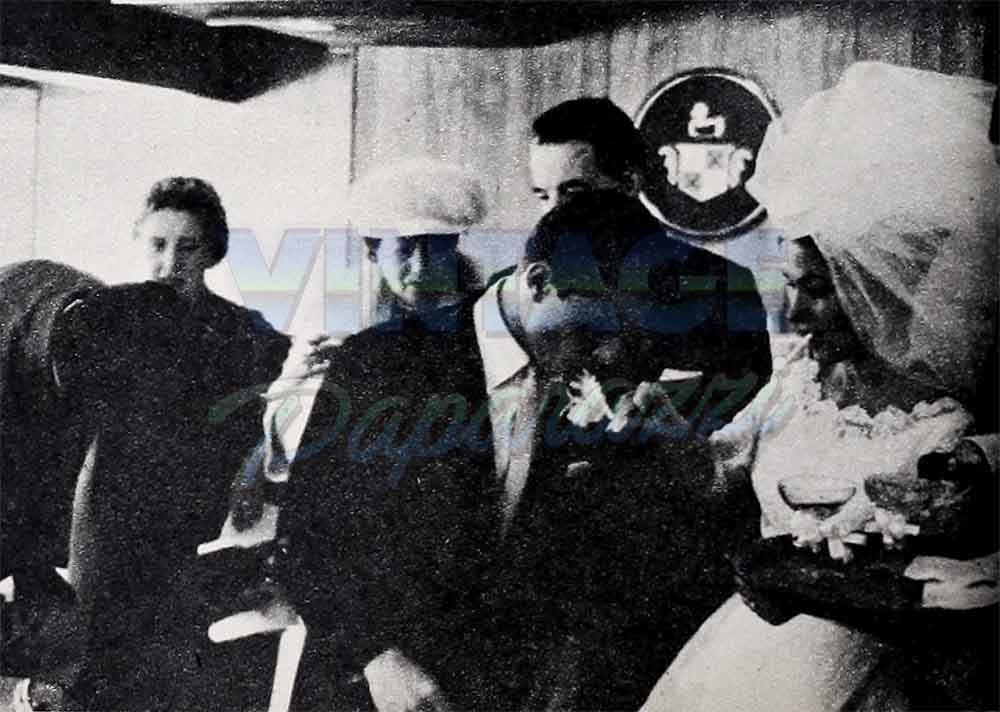
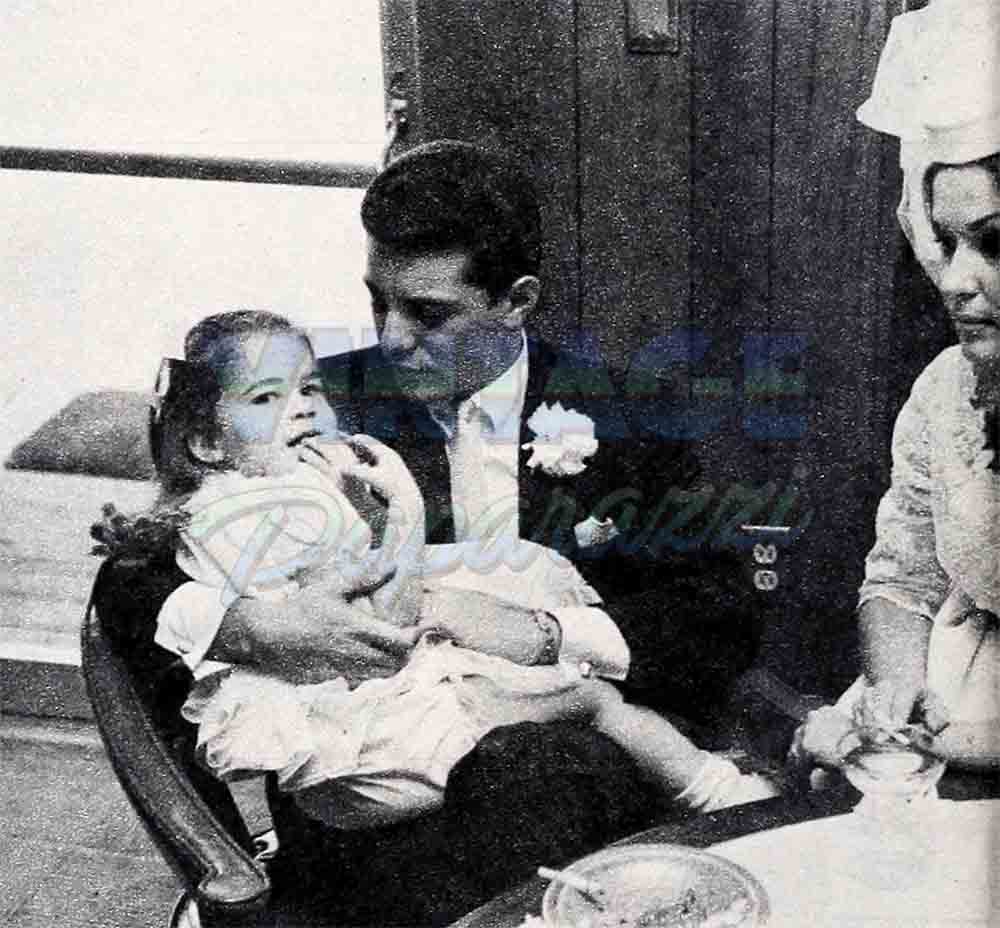
There was no question now in Frankie’s mind. They had gay, laughing times and quiet, serious times. They’d go swimming together, dancing, to movies. They’d talk about everything, not always agreeing. “This girl’s no pushover, she’ll fight,” he told me. “I kid her. I tell her she can’t be right ninety-nine times out of a hundred, ninety-eight maybe, but not ninety-nine. I like the way she thinks, it’s great. I love the way she talks. She’s just right in any situation and everyone likes her. I’d look at her when she’d say something and murmur ‘Marron!’ And she’d want to know what that meant and it’s hard to translate. But in Italian Marron sort of means Wow!”
They were together constantly, he was going to marry her someday, he knew that. He was in love with Kay, but he didn’t tell her, he held back, wondering about the responsibilities of marriage.
“I was worried,” he said, “wondering whether I was settled enough yet to really take on the responsibilities of marriage and a family. I figure when I get married, I get married only once.”
A deep, beautiful male voice is singing the “Ave Maria.” Mass continues . . . a bell rings . . .
She was in the audience for every show and every song he sang he sang to her. There was a time—earlier this year—when Frankie, playing the adult night clubs for the first time, singing ballads and standards, was so scared . . . The first time he played the Sands he didn’t eat for three days and couldn’t sleep; he was so nervous. But not now, not with this year’s experience behind him, not with Kay there in the audience. They had a marvelous Christmas. Under the tree Kay had for Frankie a handsome dark blue knitted sweater, and under the tree he had for her a gold charm bracelet with a heart charm and engraved on the back of it one word, MARRON! It was the happiest Christmas, the richest, he’d ever had. Something new had been added, something different, he had someone to belong to.
And still he held back, said nothing. On December 29, ready to do his first show, he dropped by her room at the hotel. He just wanted to say hi, just wanted to find out if she was going to the first show or the second, and what would she like to eat for dinner. “Kay was in slacks and a shirt, her hair was up in rollers,” Frankie’s eyes dance when he remembers that. He had a few moments and they chatted, cheerfully enough about all sorts of things. Then Kay said quietly that she must make plans to get back to LA and her job.

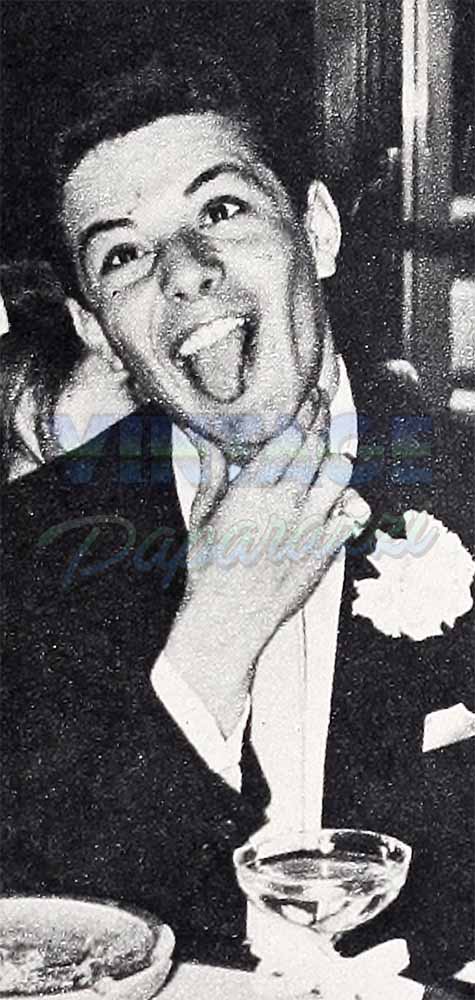
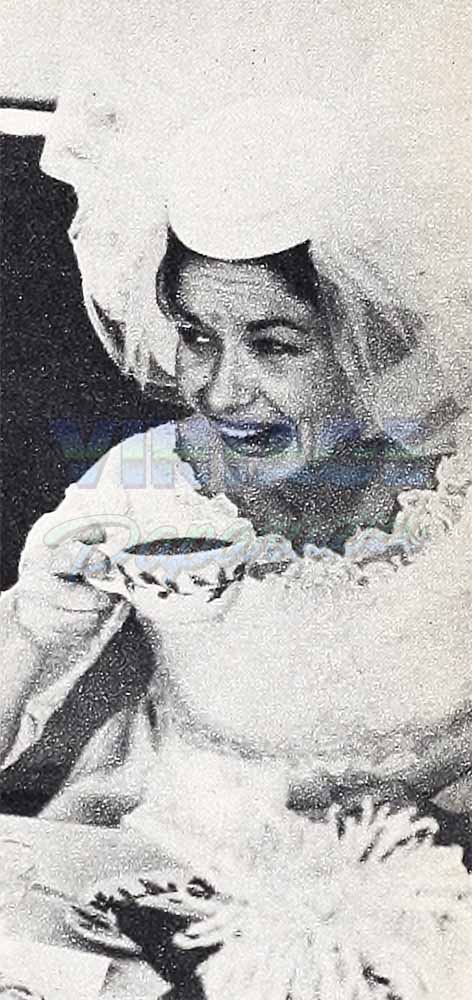
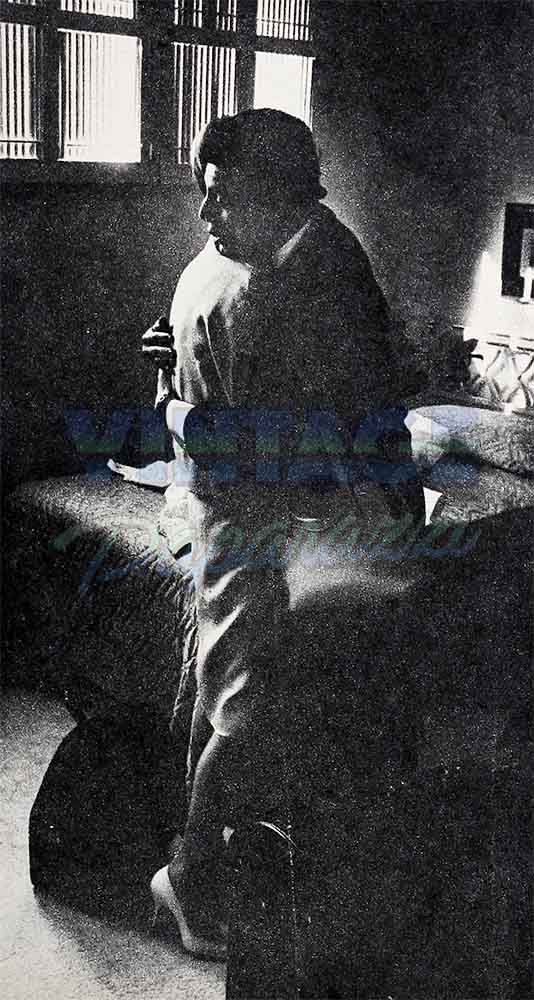
“Let’s get married,” Frankie said.
“What?” she said, as if she were hearing wrong.
“That’s right . . . let’s get married.”
“When?” she asked—just like that.
But there was no time to discuss that just then. They both suddenly saw the clock and Frankie kissed his girl and rushed downstairs to do his show.
“The next night between shows I took everyone out to dinner,” he told me. “I was looking for just the right time and the right place to break the news. We found a very good Italian restaurant and Kay and I sat there, hand in hand, close together and my mother was kidding us. ‘Well, did you see that arrow go by?’ she’d say. ‘Cupid’s really working overtime tonight!’ Finally, after dinner, we got in the car and drove back to the Sands’. All the time in the car, Kay and I were kissing and looking at each other and my mother said, ‘When are you two going to get married?’
“So I said, ‘Being as how you asked, we’ll probably get married in June.’ ‘You’re kidding,’ she said. ‘No, Mom, we’re very serious,’ I said.”
So serious that they finally decided on January. First of all, why wait? Frankie is booked solidly and they want only one thing of life—to be together. Sometimes in the weeks that followed he wished they’d been married right then and there.
It wasn’t easy, one week before the wedding, to awake one morning to a screaming headline: Frankie Avalon named by girl in baby case . . . and a three column picture of the “jilted” girl and the baby she says Frankie fathered. Put yourself in Frankie’s place. He had found everything he wanted in life in a girl and she was about to become his wife. How would Kay react? He rushed to the telephone, called her and told her. And as long as he lives he’ll never forget her response.
“Don’t worry about a thing,” she said.
She didn’t ask a single question.
“She’s stuck right with me all the way,” Frankie said.
A bell rings, the priest genuflects.
Now I can see him, standing at the altar, looking at the ring on her finger. I know he can still hear her voice in the jewelry store worrying about the diamonds. . . . “Suppose I get some dirt on it working around the house, suppose I ever lost a diamond washing dishes?” she worried. “So what,” Frankie’d said. “we’ll have another diamond put in.”
Communion is offered, the wafer to each tongue. The beautiful voice is singing, “Come then sweet Saviour to this morning place . . . Give to these children thy blessing and grace . . .”
The wedding march again and up the aisle come Frankie and his bride. You’ve never seen anything like it on film. Happiness. Real and wonderful.
Outside the church, they now stand, the newlyweds, in the bright sunlight, facing a new life. Photographers are waiting, shutters click, a hundred teenagers crowd around to shout good wishes. Frankie kisses his Kay.
The ceremony is over, Frankie Avalon has found his love . . . and his life.
Tonight they’ll be dining in Mexico City at the Villa Fontana—the violins will be playing for them, the food will be superbly cooked for them, the moon will be shining for them. For this a new world . . . just for them.
—JANE ARDMORE
Frankie will soon be seen in AIP’s “Operation Bikini,” Warners’ “The Castilian” and MGM’s “Drums of Africa.”
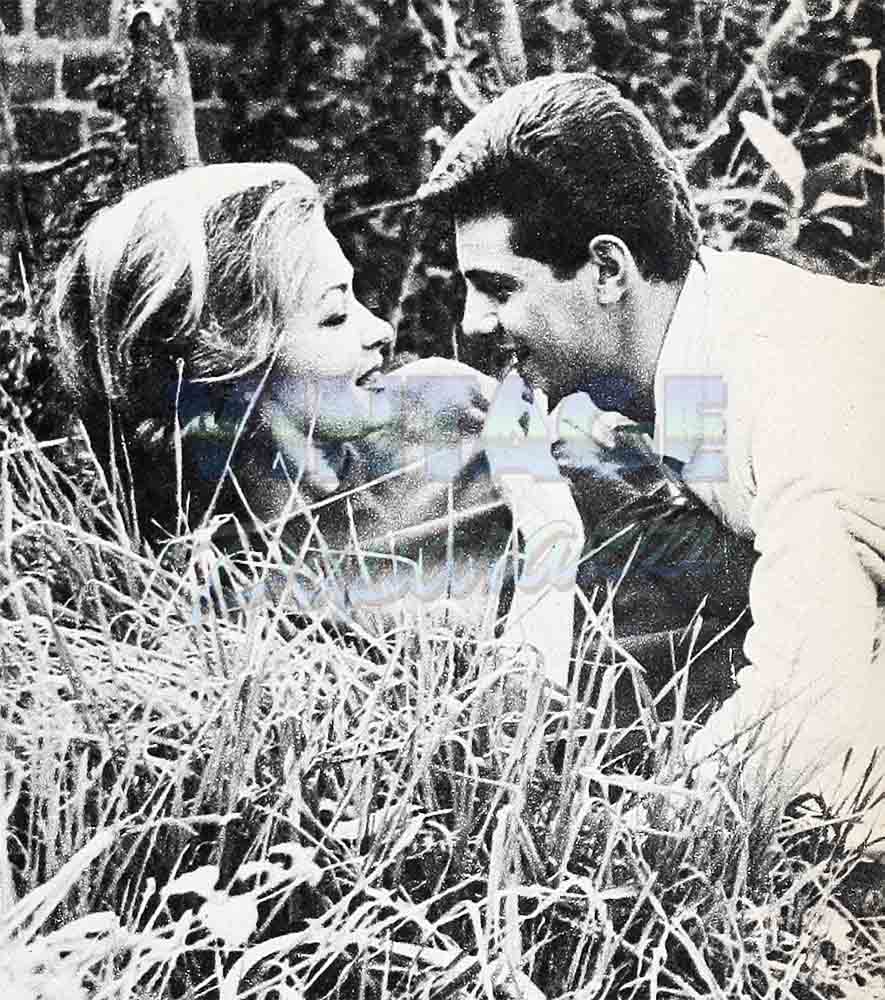
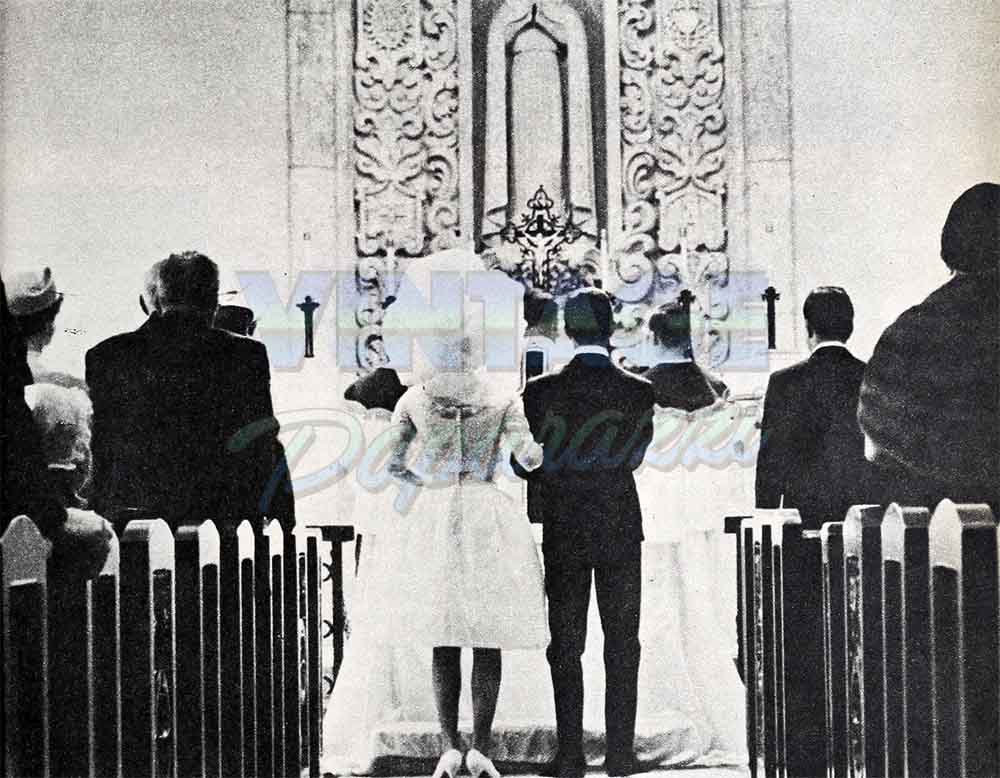
It is a quote. PHOTOPLAY MAGAZINE APRIL 1963




